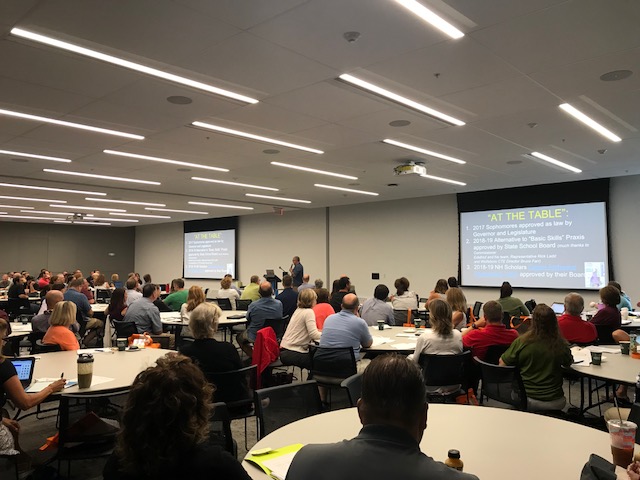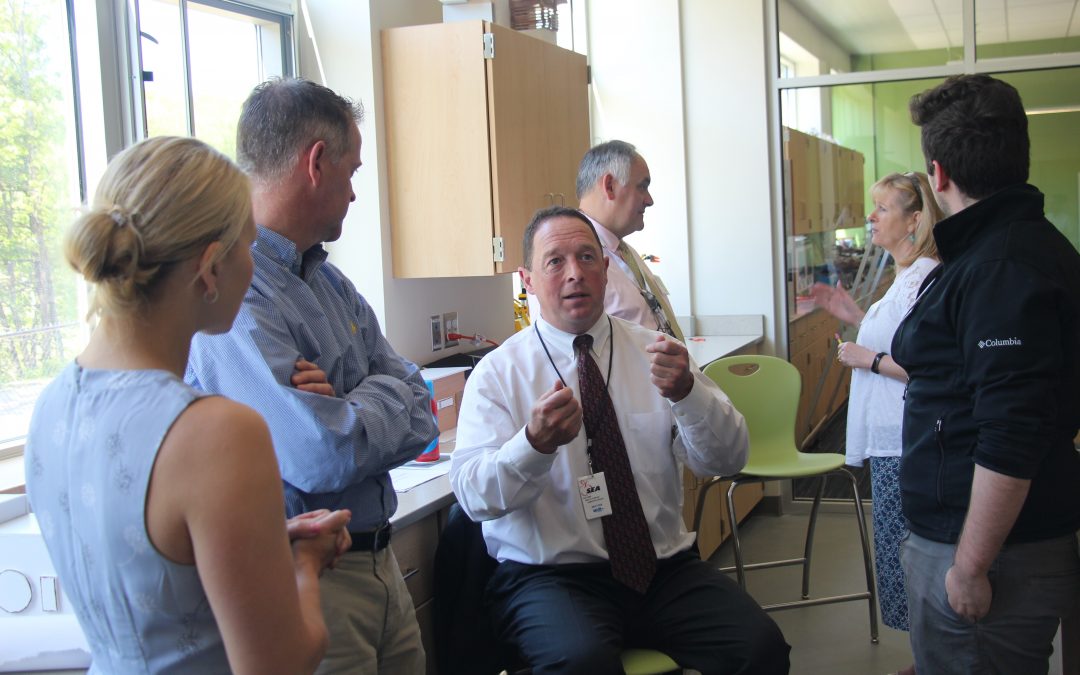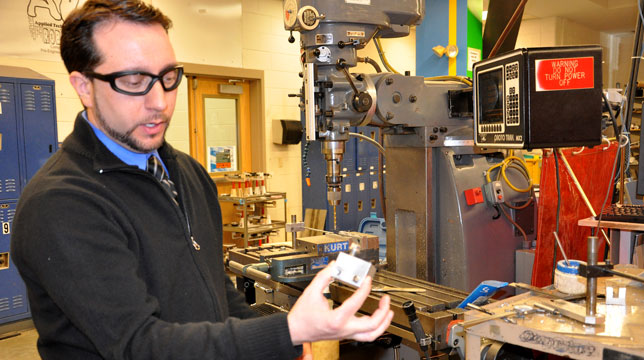
Sep 13, 2018 | Article, Professional Development
 Educators shared best practices and honed their skills to improve services provided to students in New Hampshire.
Educators shared best practices and honed their skills to improve services provided to students in New Hampshire.
PLYMOUTH, NH – More than 130 educators that serve nearly 10,000 career and technical education (CTE) students in New Hampshire attended a professional development and networking conference in mid-August. The New Hampshire Department of Education co-sponsored the summer conference, the second of its kind in the state, which was expanded in 2018 from two to three days. The conference, according to organizers, supported the state’s demand for increased student participation in CTE programming and provided educators and administrators the opportunity to collaborate with their peers.
Speakers included Frank Edelblut, the commissioner of the New Hampshire Department of Education, state Sen. David Watters, D-Dover, and Dr. Kathleen C. McCabe, who helped facilitate work developing professional communities of practice around the state.
In New Hampshire, there are 26 CTE centers and satellite programs. Students attending CTE classes and programs gain technical skills in a variety of high wage, high demand career pathways that support the state’s labor markets. The Granite State currently has record-low unemployment as well as solid economic growth. Combined with the retirement of baby boomers, many good jobs are not being filled. The CTE community supports young people interested in these career pathways.
The NH-CTE Summer Conference provided a forum in which educators could come together with industry leaders, post-secondary partners, and other experts in the field of education to share best practices and hone their skills to focus on continual improvement of the services provided to students.
Industry partners at the conference included NH’s Sector Partnership Initiatives, the NH Lodging and Restaurant Association, Associated Builders and Contractors NH/VT, Methuen Construction, Silvertech, Graphicast, and TurboCam.
Attendees also toured the Plymouth Regional Applied Technology Center renovation project and gathered ideas for their own future renovation projects.
Conference attendees noted that the event was very organized and it helped educators connect and share resources.
Conference resources are available in this NH-CTE Summer Conference 2018 Google doc.
For more information about the conference, contact Courtney Ritchings at Courtney.Ritchings@doe.nh.gov or 603-271-3809.

Sep 7, 2018 | Article
First and foremost and speaking for our our NHCTA / NH-CTE Board, we want to affirm our pride in–and admiration of–the NH-CTE community. It is an exciting time and certainly a moment to promote ourselves as a powerful and worthy option for high school students.
Key Theme
If there was one big picture theme for this academic school year, it would be: college and career readiness. For years as a culture, this concept has really been disproportionately focused on metrics aligned to “college readiness” rather than “career.” This model is not sustainable: not enough young adults are not making the gains they need to gain career employment; nor are enough businesses benefiting from a diverse and prepared workforce.
The state, and the country for that matter, has awoken–much to the credit of the CTE community (schools, post-secondary, industry, students, parents, friends.)–to realize that a more strategic and balanced approach to college and career readiness is needed. CTE is well positioned at this crossroads given our strategic initiatives over the past decade or more.
Your NHCTA / NH-CTE Board has been working hard to keep us “at the table” and promote our relevance (and agenda) to the state’s overall educational model. It is a worthy endeavor led by volunteers who consider themselves passionate stewards of NH-CTE.
Highlights
- The NH State School Board approved an alternative ALT IV route that does not require the Praxis, but is instead based on a candidate’s licensure and/or industry certification to demonstrate their “basic skills.” (special thanks to Bruce Farr and Barney Keenan)
- The NH Scholars State Board approved a fourth state designation called “Career Pathway,” which is almost ready for a pilot run this year. The criteria aligns beautifully to CTE priorities.
- The promotion of work-based learning (WBL) statewide through a partnership with the National Governors Association.
- The governor and legislature’s continued support of CTE center renovations: Salem and Dover opened this year, and Rochester, Alvirne, and Plymouth are in the works.
- Sustained efforts to partner with groups like the ELO network, The Alliance, NHCBE, and CCSNH to promote mutual interests to students and parents.
- The Bureau of Career Development support of upgrades to our competencies.
Our Board sponsoring statewide NH-CTE awards for excellence. We will celebrate key players, including teachers and industry partners to career counselors.
- The NH Senate continuing to support the SB190 CTE Focus Workgroup to create the most supportive environment, including through RSA’s, for CTE to flourish.
I offer a virtual shout out to the Commissioner of Education Frank Edelblut, Deputy Commissioner Christine Brennan and DOE division heads Heather Gage, Caitlin Davis and Michael Seidel. In addition, I also thank two staff members, Bill Ross and Amanda Noyes from credentialing, each of whom have been extremely professional in their collaboration with NH-CTE. This is a positive time for us and their genuine support for CTE has been remarkable.
Challenge
The one area in which we challenge our community is developing a comprehensive approach to cluster-based program development. This goes beyond professional development – it is team focused. We have had our fits and starts over the past few years and not enough gains have been made.
We are open to all ideas that help NH-CTE teachers create quality networks based on best practices to improve student performance. I credit the staff of the Bureau of Career Development and consultant Dr. Kathy McCabe for their collective efforts this summer at the 2nd annual NH-CTE conference. We still, however, have have a ways to go and the path is very tough to define.
Looking Ahead
Finally, our NHCTE / NH-CTE Executive Director Christine Carr has entered her 2nd year. She took a year to travel throughout and learn our community, and now she has come forth to author and implement a new focused vision for NH-CTE.
She is certainly challenging us. We will share details soon, but I would summarize that her proposal, which is supported by our board, is both bold and logical. This is a time for us to be ambitious.
I hope 2018/19 is your finest year. Please feel free to contact me or our board with any questions, concerns or (even) a willingness to be a part of our efforts. Also contact us at media@nhcta.org with any great story leads. The NH-CTE story needs to told regularly!
Steve Rothenberg, NHCTA/NH-CTE President
srothenberg@sau8.org
NHCTA / NH-CTE Board
President Steve Rothenberg, Concord
Vice President Chris Dodge, Salem
Treasurer Al Smith, Littleton
Secretary Jen Haskins, Pinkerton
Bruce Farr, Wolfeboro
Amanda Bastoni, Nashua
Bonnie Ackerman, Newport
Lisa Danley, Dover
Executive Director Christine Carr
Administrative Support: Debbi Cox

Aug 31, 2018 | Article, Uncategorized
In 2017, the New Hampshire Lodging and Restaurant Association (NHLRA) attended several sessions at the annual CTE Summer Conference to better understand the CTE model, which led to increased involvement at the same event this August.
We find our relationships with CTE centers integral to developing and strengthening the hospitality industry. In 2017, we attended several sessions as a way to further understand the CTE model, learn about successful messaging techniques, and network with teachers and administrators. In 2018,
“As Hospitality Sector Advisor for the Sector Partnership Initiative, we were invited to host a panel on ‘Connecting the Dots in Hospitality,’” said Amie Pariseau, NHLRA education and workforce development director.
The panel consisted of two members of industry, two educators, one career counselor, and one student.
“We also participated in a larger forum about the Sector Partnership Initiative and attended sessions,” she added.
In commenting on the theme of ‘Connecting the Dots in Hospitality,’ Pariseau said the NHLRA wants to connect industry leaders with students both in the classroom and in industry settings.
We want to introduce kids to what the restaurant, lodging, and tourism industry is all about,” she explained. “We’re providing them with a real sense of the broad range of opportunities available to them.”
She said some examples of how NHLRA is accomplishing these objectives include the following:
Inaugural New Hampshire Hospitality Month in April 2018
21 industry sites (hotels, restaurants, a ski mountain, a winery, Delta Dental Stadium) hosted 39 tours that introduced 320 students to various areas of the industry.
Girls Incorporated
NHLRA presented to 30 young ladies (grade 6-10) at a Young Women’s Leadership Camp about the nature of the hospitality industry, available careers, and importance of the industry to the state. Two women chefs joined the group for a food demonstration.
The Downtown Manchester Hotel also hosted an industry panel of women holding leadership roles at the property- general manager, controller, banquet manager, executive housekeeper, restaurant manager, front office manager, and director of sales.
“The attendees listened to what their job involved and their path to get where they are,” said Pariseau. “It was open to question and answer as well.
Five women from industry (executive chef, restaurant owner, training/ leadership director, director of events, on-site catering/ off-site catering manager and social media manager) also attended their wrap-up Career Fair.
“The campers had one-on-one time to ask questions and interact with the women,” she said.
Granite State College
“There is a need to support continuing education in the hospitality industry,” noted Pariseau, which she said explains why the NHLRA and Granite State College partnered to design a “workshop series” to fill that gap.
“This certificate program covers topics such as leadership, effective communications, and conflict management,” she said.
Across the three groups, 62 industry members focused on leadership, communication, and conflict resolution. Out of the 62 attendees, 48 completed all three sessions and received a certificate of participation endorsed by Granite State College and the NHLRA.
The next series, entitled Managing Human Resources in Hospitality, will take place this fall.
Why work with CTE Centers?
As far as Pariseau and the NHLRA itself is concerned, becoming more involved with CTE centers statewide in New Hampshire makes sense in a number of ways.
“The NHLRA is working to engage students about what hospitality is and what this great industry is all about,” she said. “It’s not just about being a chef or a front desk manager. Those are two well-known and needed careers, but it’s also about event managers, auditors, human resource managers, social media marketers, and more.”
She added, “Career pathways in hospitality reveal the ‘promote from within’ mindset and the increasing salaries that build with experience.”
The evolving partnership with CTE in NH also helps highlight the NHLRA, which Pariseau readily acknowledges is not well known by the general public
“We would like parents, non-NHLRA members, and other community resources to know that we can be a resource in regards to educational possibilities and industry connections such as job shadows, internships, and employment,” she said.
She said the NHLRA fully supports the efforts of the CTE centers.
“We will continue to share the network of engaged industry members to provide access to in-school and out-of-school opportunities to their students,” she said.
To learn more about the NHLRA, visit https://www.nhlra.com.

Aug 7, 2018 | Article
As part of the Creative Computing Challenge (CCC), a five-year program funded by the National Science Foundation, teachers at two Career & Technical Centers in NH this past year engaged students in creating their own apps. While on the surface, the class could be characterized as “computer science,” its purpose was to help teach computational thinking integrated into already on-going CTE class content.
“Computational thinking is essentially problem solving, but in the computer sense it’s essentially boiling everything down to yes or no,” said Curtis Killion, Computer Software & Media Applications Instructor at Salem HS Career & Technical Education Center.
Noting that computational thinking is really just “logical thinking,” Killion said that the applicability of the concept is quite broad.
“If you break things to simple questions like yes or no, you can logically build tools that can really handle complex tasks,” he said. “Working through this logic requires clear thinking and an ability to break down problems into very small parts in a step by step logical approach.”
“Getting students, or adults for that matter, into that “computational thinking” mindset requires a lot of patience. According to Killion, though, computational thinking is “really easy and simple” at its core.
Whereas Killion had students in his class create print and digital promotional collateral through the Adobe Creative Suite, students at the RW Creteau Regional Technology Center in Rochester worked in entirely different arenas.
Taught by Tracy Mitropoulos, one Accounting class provided students with the opportunity to create a fictitious business with the second focused on assessing child development milestones. She acknowledged, however, the second class was much more successful.
“They met with a preschool teacher and decided what they wanted to assess–it was more real for them,” she said. “There really was not a problem to solve in the accounting class, so the interest in it was not there.”
For Mitropolous, the resistance she met in the accounting class serves as fuel for the future.
“Unlike my Child Development students, my Accounting students did not have a ‘real purpose’ other than a grade for really caring about the app they were creating,” she said. “I need to find a way to make the Accounting App Project more meaningful.”
For Killion, his experience helped to open up his thinking about computer programming.
“My perception had always been that programming was about learning a language, but in reality it’s actually quite simple,” he noted. “As a teacher, I realized my perceptions about programming may have influenced my own students–and already this year, I had one young woman decide she was going to pursue a career in programming.”
Both teachers’ experiences within the classes helped to highlight an idea fundamental to CCC itself, which is that education is more effective when it frames the learning experience around what interests the students.
“A lot of questions were generated [in the class]–and although I often didn’t have the answers, it made me think of how relating content to what kids care about can really generate results,” said Killion. “The students really wanted to learn, and that attitude can make all difference in any subject area.”
Mitropoulos agreed and added, “Having a real purpose, or use for the completed apps, was motivational. As the Child Development students began assessing their preschool children, the sense of accomplishment they felt was palpable as they shared their experiences…As teachers, we have to be willing to embrace something new.”
This work is supported by grant #IIA-1348352 from the National Science Foundation.
This is the second of a multi-part series on CCC and the relevance of computational thinking in the classroom and industry in NH.

Jul 22, 2018 | Article
Not one to promote himself, Frank Xydias, high school engineering teacher at Milford High School, acknowledged surprise when he learned that a student–or several –nominated him for the iRobot -STEM -MVP teacher of the year award. He was even more surprised when he found out he won.
“I was happy, excited and honored at the thought of receiving such a prestigious award,” he said. “I then shared this news with family as it is a wonderful feeling to be acknowledged by a student…To have a student take the time to recommend me for an award such as the iRobot -STEM MVP award truly is amazing.”
The unexpected accolade, which culminates in receiving his award on September 12 at Fenway Park and being introduced on the field, serves as a source of reflection on why he chose a career in education.
“It is because you want to make a difference,” he said. “It is because you care about students and want to share your knowledge with others. It is heartwarming when a student goes into a career path because you inspired them.”
For Xydias, his chosen career field in STEM, which sometimes is referred to as STEAM with the ‘A’ standing for Arts, has never been more exciting.
He cited Milford’s Young Inventors program as one example. In this program, students create their own invention and present it in a professional setting.
Another program for which he expressed fondness is STEAM Nights, which provide opportunities for all Milford students to learn about career pathways offered in STEAM career paths.
As a result of these and other STEAM programs in the Milford School District, Xydias said they received personal invitations to participate and register for the Massachusetts STEM conference as a panel member for the Young Inventors organization.
“This will highlight some of the tools Milford uses to increase student participation and STEM awareness,” he explained.
They will also present at the Christa McAuliffe Technology Conference in October.
“One of the Christa McAuliffe board members attended our STEAM nights and consequently invited us to participate,” said Xydias. “We were asked to talk about our STEAM nights and invite our students and community members to join us on a panel.”
Xydias is also involved in the New Hampshire Joint Engineering Society, which is opening its doors to students at 13 school. Each school can bring 3 students and teachers to the conference.
“Students will be displaying projects as well as attending the open workshops to learn about current technology,” he said. “We have groups from FIRST, Young Inventors, PLTW, NHDOT TRAC, VEX robotics and STEM groups attending.”
In the summer, Xydias works with Manchester Community College and hosts a series of 5 STEM camps for middle school students. As part of the school’s summer learning series, he said they bring students off site to visit local engineering companies.
“Roughly a quarter of the students attending these camps attend my STEAM nights because they realize their learning and passion should not stop during the 180 days they are in school,” he said. “They learn to seek out opportunities for success.”
As for why Xydias stays so motivated about STEM or STEAM year round, he cited those “a-ha” moments experienced by students. One such moment occurred last year when he brought 50 female students to the Girls in Technology event at Manchester Community College.
“I was sitting in on a lab and watched the lightbulb of excitement and wonderment fill on each of the students’ faces,” he said. “This is the excitement that I see on the faces on my students in my class.”
He sees this excitement off-campus, too, especially when they visit local companies.
“Companies like Hitchiner is not just another company to that student,” he said. “It is a place they could work, a place where they have a connection, a place they can better understand.they have a connection to, and a better understanding of our community partners…Seeing that excitement in a student’s face is just one of the reasons why I love what I do.”

 Educators shared best practices and honed their skills to improve services provided to students in New Hampshire.
Educators shared best practices and honed their skills to improve services provided to students in New Hampshire.



